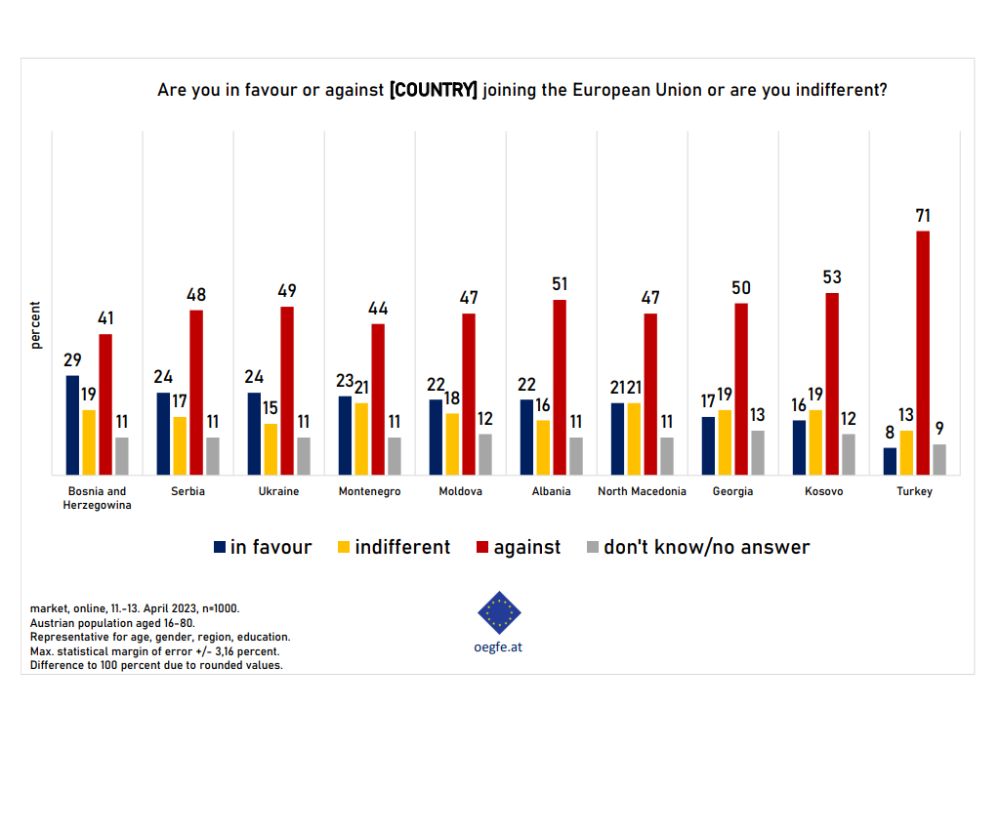Austrians remain skeptical on a further enlargement of the European Union – no (potential) candidate country could currently count on majority approval. Opinions are also divided on whether Bulgaria and Romania should join the Schengen area. These are the results of a current survey by the Austrian Society for European Policy (ÖGfE), which was conducted online throughout Austria by market between April 11 and 13, 2023.
“Austrian governments traditionally have been staunch supporters of EU enlargement, in particular regarding the accession of the Western Balkan countries. However, citizens in Austria have – traditionally – a rather different view. There is currently no clear support for an expansion of the Schengen zone either. Yet, public opinion is divided here, reflecting the domestic political discourse. The feeling is that consolidation of the EU should be given priority before embarking on new, ambitious integrations steps”, says Paul Schmidt, Secretary General of ÖGfE.
Asked which country of the Western Balkans should join the European Union, Bosnia-Herzegovina still has the highest approval rate among Austrians: 29 percent would welcome the country’s membership, while 41 percent would reject it (19 percent are indifferent, 11 percent “don’t know / no answer”).
The approval ratings for Serbia, Montenegro, Albania and North Macedonia are between 24 percent and 21 percent, and even fewer – 16 percent – welcome Kosovo’s membership. The explicit rate of rejection in this group of countries ranges from 44 percent (Montenegro) to 53 percent (Kosovo).
Support for Turkey becoming an EU member is even lower: only 8 percent would welcome this step, while 71 percent would reject it (13 percent “indifferent” | 9 percent “don’t know / no answer”).
Compared to the last survey from July 2022, support for the accession of Serbia and Albania has increased by 8 percentage points each, we can also see stronger support for Bosnia-Herzegovina (+ 5 PP) and Turkey (+ 3 PP).
24 percent of respondents would welcome Ukraine‘s EU accession, while 49 percent reject it. 15 percent are indifferent, 11 percent cannot comment on it. Compared to July 2022, the opinion on this question has hardly changed (approval: + 1 PP / rejection: – 2 PP).
EU membership of Moldova is currently welcomed by 22 percent of Austrians (+ 3 PP compared to July 2022), 47 percent reject it (+ 2 PP), 21 percent are indifferent (- 3 PP). 12 percent do not give an answer (- 3 PP). 17 percent explicitly approve of Georgia‘s accession (+ 3 PP), while 50 percent are against it (- 1 PP). 19 percent remain indifferent (-2 PP) and 14 percent do not take a position (- 1 PP).
“The Russian attack on Ukraine has brought a new dynamic to the faltering enlargement process. A policy that strongly supports EU enlargement should use this momentum and explain why the integration of our neighbors is important especially for Austria and what can be done to speed things up,” says Schmidt. “On the other hand, EU accession of Ukraine, Moldova and Georgia can realistically not be expected in the near future. It is all the more important to deepen cooperation and underline their European perspective.”
The wish of Bulgaria and Romania of joining the Schengen area is currently not supported by a majority in Austria. 38 percent would be in favor of Bulgaria being part of the Schengen zone, 42 percent would reject such a plan though (20 percent “don’t know / no answer”). In the case of Romania, 36 percent would be in favor of integrating the country into Schengen, while 44 percent speak out against it (20 percent “don’t know / no answer”).
However, approval for Schengen enlargement is higher than it was the case a few years ago. In 2017, 23 percent of Austrians agreed with the statement “In order for the EU’s external border to be better protected, Romania and Bulgaria should quickly become members of the Schengen zone”, while 65 percent rejected this.*
“The debate on whether Romania and Bulgaria should join the Schengen area is strongly polarized in Austria. Not surprisingly, public opinion is divided on this question. The EU Commission has confirmed that the two countries meet all Schengen requirements, while Austria insists on its veto. In the medium and long run, Bucharest and Sofia should not be victims of the conflict over a common European asylum and migration policy. We should therefore strive to close this integration gap and find constructive solutions.”
The current survey was conducted from 11 – 13 April 2023 by market (www.market.at) on behalf of ÖGfE. 1000 respondents were questioned online (Austrian population from the age of 16-80 / weighted according to gender, age, education and region). Maximum margin of error approx. +/- 3,16 percent. Difference to 100 percent due to rounded values respectively „don’t know / no answer.)
*Tel SWS 256 (Sozialwissenschaftliche Studiengesellschaft), 25 September – 2 October 2017, (Austrian-wide survey by telephone, n=529, Maximum margin of error approx: +/- 4,3 percent)






